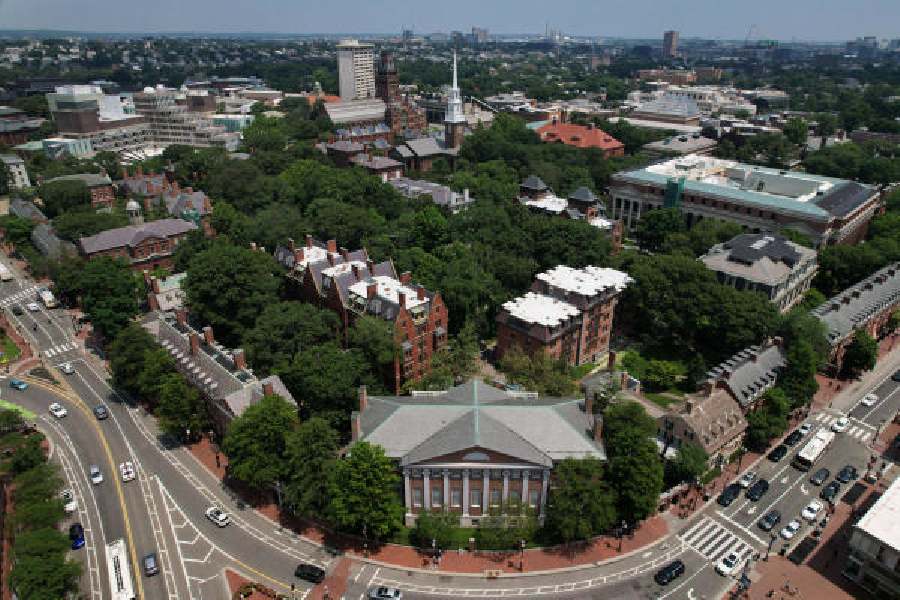The US education department has opened a civil rights investigation into Harvard University’s legacy admissions policy, inserting the federal government directly into a fierce national debate about wealth, privilege and race after the Supreme Court gutted the use of affirmative action in higher education.
The inquiry into one of the nation’s richest and most prestigious universities will examine allegations by three liberal groups that Harvard’s practice of showing a preference for the relatives of alumni and donors discriminates against Black, Hispanic and Asian applicants in favour of white and wealthy students who are less qualified.
The education department’s Office of Civil Rights has powerful enforcement authority that could eventually lead to a settlement with Harvard or trigger a lengthy legal battle like the one that led to the Supreme Court’s decision to severely limit race-conscious admissions last month, reversing a decades-long approach that had increased chances for Black students and those from other minority groups.
The move by the Biden administration comes at a moment of heightened scrutiny of college admissions practices following the ruling, which has resurfaced long-simmering anger about the advantages that colleges often give to the wealthy and connected.
Harvard gives preference to applicants who are recruited athletes, legacies, relatives of donors and children of faculty and staff. As a group, they make up less than 5 per cent of applicants, but around 30 per cent of those admitted each year. About 67.8 per cent of these applicants are white, according to court papers.
After the court’s decision, President Joe Biden said legacy admission policies expand “privilege instead of opportunity”. Representative Alexandria Ocasio-Cortez, Democrat of New York, tweeted that the practice is “affirmative action for the privileged”. Senator Tim Scott, Republican of South Carolina and a presidential candidate called for Harvard to eliminate “preferential treatment for legacy kids”.
At Wesleyan University, a liberal arts college in Connecticut, President Michael S. Roth announced earlier this month the end of legacy admissions at his school, saying the practice was a distraction and “a sign of unfairness to the outside world”. The federal inquiry comes after a formal complaint filed by three groups earlier this month.
Lawyers for the groups — the Chica Project, the African Community Economic Development of New England, and the Greater Boston Latino Network — said Harvard’s practice gives an undeserved leg up to the children of wealthy donors and alumni.
“It is imperative that the federal government act now to eliminate this unfair barrier that systematically disadvantages students of colour,” Michael Kippins, a litigation fellow at Lawyers for Civil Rights, said when the complaint was filed.
The education department said in a statement that “the Office for Civil Rights can confirm that there is an open investigation of Harvard University under Title VI of the Civil Rights Act of 1964”. Title VI is a part of federal law that prohibits discrimination, exclusion from participation or denial of benefits “on the ground of race, colour or national origin”.
Nicole Rura, a spokeswoman for Harvard, said the university was reviewing the way it admits students to ensure it is in compliance with the law after the court’s decision.
“Our review includes an examination of a range of data and information,” she said, adding that the university will continue to “strengthen our ability to attract and support a diverse intellectual community”.
Rura added: “As this work continues, and moving forward, Harvard remains dedicated to opening doors to opportunity and to redoubling our efforts to encourage students from many different backgrounds to apply for admission.” Harvard’s legacy preferences have been investigated before.
In the 1980s, the education department’s Office of Civil Rights investigated allegations that Asian American applicants were being discriminated against in favour of white students, according to court papers. The investigation blamed the difference in admission rates on legacy preferences and found that the university had legitimate reasons for favouring legacies.
The Harvard trial that led to the Supreme Court’s affirmative action decision revealed just how important legacy admissions are to Harvard. The plaintiffs described the final round of admissions, called the lop. Applicants on the cusp of admission or rejection were placed on a list that contained only four pieces of information: legacy status, recruited athlete status, financial aid eligibility and race. Based on this information, the admissions committee would decide which finalists to cut, or lop.










